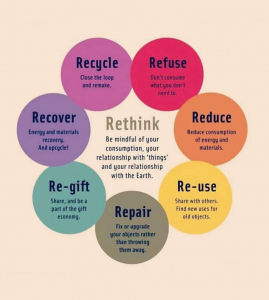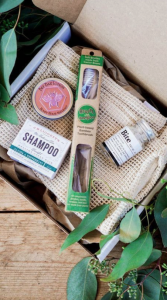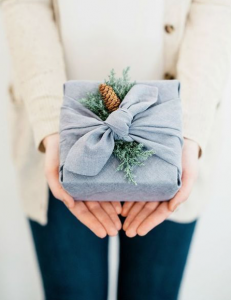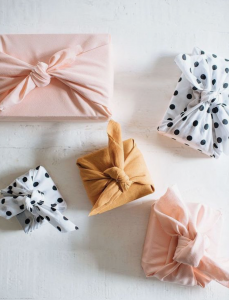Are you more Plastic or Planet this Christmas?
Christmas is one of the top two retail shopping seasons of the year, generating roughly $680 billion, according to the National Retail Federation. Americans spend an average of $967 for items such as decorations, gifts and festive foodstuffs during the holiday season (https://www.gobankingrates.com/saving-money/holiday/how-much-americans-spend-christmas/).
The toy industry is massive. It hit $20.36 billion in sales last year and shows no sign of slowing down ― nor does the negative impact it’s having on the environment.
Plastic toys, which tend to be inexpensive and vibrantly colored, account for 90 percent of the market, according to a plastics trade magazine. And while they pose the same risks as any other plastic item, these cheap playthings often have shorter life spans than high-quality toys and are pretty much impossible to recycle. There’s nothing quite like seeing the look of sheer joy on a child’s face after handing him a brand new, shiny gift. That is, until you consider just how damaging an effect said present will have on the world he’s going to inherit.
Environmentalists have a number of pressing concerns when it comes to the way in which plastic is interacting with the environment. In 2014, Americans generated about 33 million tons of plastic. The year before, only 9.5 percent of plastics were recycled, according to the U.S. Environmental Protection Agency. But the scope of the issue is so severe, experts say they can’t even pinpoint accurate figures to define the problem.
One of the things that separates plastic toys from other plastic objects is that they’re essentially destined for the landfill, said Brent Bell, vice president of recycling at Waste Management, “There are really very few toys that are good candidates for recycling” (https://www.huffingtonpost.com/entry/your-kids-toys-are-killing-the-planet_us_58ffa383e4b0f5463a1a9472).
How much does the UK alone throw away over the festive period? Here are some shocking figures, especially when you take into consideration the waste in other countries too.
The UK throws away:
— 1 billion Christmas cards.
— 83 sq km of wrapping paper (enough to plaster the whole of Brighton and Hove with festive greetings).
— 125,000 tonnes plastic packaging.
— Six million Christmas trees (as many as there are trees in Epping Forest and all London’s parks put together).
— 4500 tonnes of aluminium foil, enough to manufacture 14 Boeing 747s.
Source: Envirowaste
As well as food, it is also important to think about the wrapping paper and packaging that we purchase, use and discard during the Christmas period.
This year, we are expected to throw away no less than 227,000 miles of wrapping paper, enough to wrap around the Island of Jersey
Additionally, if we placed all our Christmas cards alongside one another they would stretch around the world 500 times.
We also get through 4,500 tonnes of tin foil and 125,000 tonnes of plastic packaging during the Christmas season.
Greenpeace recently found that as little as 1kg of wrapping paper emits 3.5Kg of CO2 during its production process, taking 1.3kg of coal to power its production.
This does not take into account further packaging and transportation (https://commercialwaste.trade/the-true-cost-of-christmas/).
Britons will use an estimated 300 million plastic straws and cups at Christmas parties this year. Around 37% mistakenly believe that Christmas cards with glitter can be recycled and 60% are incorrectly planning to recycle shiny or glittery wrapping paper (https://news.sky.com/story/amount-of-waste-thrown-out-at-christmas-unacceptable-polls-finds-1117106).
Everywhere you look you will find shocking articles and figures about how much the world consumes and how this dramatically increases during festive seasons such as Christmas. This issue could dramatically change if people took on the mindset to have a kind to the planet kind of Christmas. As humans we have adopted an unhealthy relationship with “things”. Do we really need these “things” and how can we create a Christmas that is better for our planet? Read on to explore ways you can reduce your waste this Christmas.

Picture: Green Route Cape
Buy Local: Buying local is special, especially if it is handmade. Not only do you find gifts that are unique you also support your local independent shops. Sometimes it means more expense but go with a budget and you will find something that will suit it. Buying online means adding to packaging waste and large CO2 emissions.
Regift toys or buy toys not made from plastic: There is nothing wrong with secondhand toys! Speak to your friends see if they want to swap any toys that are not played with anymore by their children and exchange with toys that your children do not play with. If you do buy new toys then find items that are made from other planet friendly materials.
Buy reusables as presents: Know a coffee lover? Buy them a reusable coffee cup! They are bound to get lots of use out of this while saving the planet from take out coffee cups and plastic lids. There are thousands of products out there such as reusable water bottles, bags, cutlery, lunch boxes and straws.



Avoid cards and wrapping paper that are “shiny” or have Glitter: Not only is it annoying when you have to spend the rest of the day with people trying to pick bits of glitter off your face you also cannot recycle these. Avoid “shiny” materials and glitter for a more waste free Christmas.
Avoid using single use plastics: Hosting a Christmas party? Avoid using single use plastics such as straws, cutlery, plates or cups. Perhaps get everyone to bring their own items to use or use alternatives such as ethically sourced bamboo or other biodegradable materials.
Talk to your workplace, friends and family: Talk to people about reducing plastic at events such as their family Christmas or office party. Also talk to people about reducing plastic in general, a good new years resolution idea!
Reuse Christmas decorations: Use what you already have, buy second-hand, borrow or try something new with nature decor ideas.
Group gifts: Rather than multiple gifts for friends and colleagues, such as Chocolate boxes with plastic trays, why not opt for a group gift or agree to all put money together for an experience together.
Eco gift ideas: Why not sponsor a child or animal for someone, donate a tree to be planted (for example a Moringa tree in Africa), buy eco beauty products, book a workshop or class for someone, give items made from reused materials or suggest a day out or weekend away.
Sticky tape: Sellotape or sticky tape is not recyclable. Something to bear in mind when recycling your wrapping paper, you need to remove it all. Try wrapping presents with natural string, ribbon or tissue paper in a bag that can all be reused.
Regift unwanted gifts: Theres no shame in wanting a better planet
Ask people what they will like: Ask friends and family what they would like to avoid unwanted gifts. Also tell people what you would like and encourage people to really think about what they really want or need.
Reuse wrapping paper: Keep what you are given, bags, paper, cards, ribbon, string, and reuse them!
Other wrapping ideas:



Re work your xmas cards: Keep your Christmas cards and make cards out of them for the next year.
Skip the straw: Meeting friends, family and colleagues for a drink this Christmas period? Skip the straw or bring your own reusable straw!
In the supermarket: Try to buy food that isn’t heavily wrapped in packaging. It is easy to buy convenient food for such a busy period, why not suggest your guests each bring a dish or prep what you can in advance.
Look into the sustainability and traceability of what you buy: Have an interest in what you buy in terms of knowing where it came from, how it was made, who made it, are the materials and process used sustainable and not damaging to the planet? A product might look pretty but actually it might have a not so pretty past.
Lots of people may say “but I don’t have the time to do this” , however, it is the need for human convenience that has led to this enormous problem. Give planet Earth a good Christmas by being more mindful and careful with what you consume.
0 Comments